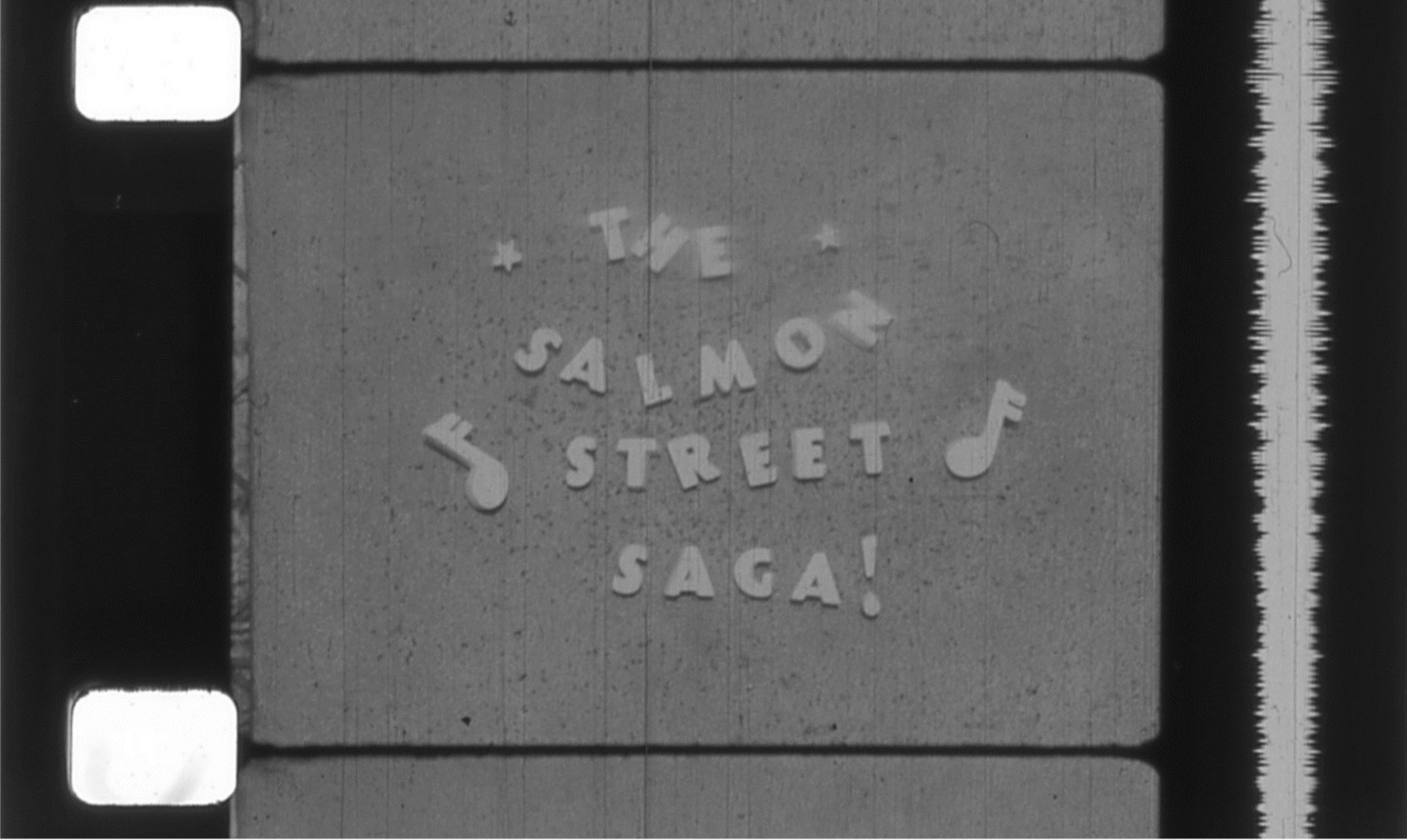Tim smith moving image collection
16mm film strip still, The Salmon Street Saga (1970), Tim Smith Moving Image Collection. Courtesy Oregon Historical Society. Image subject to copyright laws.
Conservation & Capture
Grant year: 2019
Grant recipient: Oregon Historical Society
Primary maker: Tim Smith
Original format: 16mm film, sound
Length/feet or running time: Approx. 2880ft of 16mm film
Circa: 1968-1982
Lab: Pro8mm
Digital capture format: 16mm footage captured at 2k resolution
Status: Conservation and digital capture completed
Online Access: Coming soon
Creative Commons License: Attribution-NonCommercial-ShareAlike 4.0 International: http://creativecommons.org/licenses/by/4.0/
Grantee
The Oregon Historical Society is dedicated to making Oregon’s long, rich history visible and accessible to all. For more than a century, we have served as the state’s collective memory, gathering and preserving a vast collection of artifacts, photographs, films, manuscripts, books, and oral histories. We exist because history is powerful, and because a history as deep and rich as Oregon’s cannot be contained within a single story or point of view.
Still image, filmmaker, Tim Smith (1968), Tim Smith Moving Image Collection. Courtesy Tim Smith. Image subject to copyright laws.
Filmmaker
“While growing up, I was completely fascinated with anything media related. As a kid I remember appearing on the Dr. Zoom show (KPTV) at about 1964 or so. I appeared on numerous shows and became sort of a regular. However, I do remember how I and my siblings would perform satirical acts based on tv commercials or scenes from films like A Streetcar named Desire. We even had a talent show once and invited the neighbors to attend.
My interest in film making started as early as 1967. I remember when my father bought a super 8 film camera and directed an early version of Beau Geste at the beach. But things really didn’t take off until he bought a hand spring wound Bolex H16 in 1968. This would be the camera along with an assortment of lenses that became the principal tool for filming all of my short films.
The process for creating a film usually started with an idea satirizing a type of film or an idea about a joke someone heard. The early films, starting with The Salmon Street Saga (1970) came from a ‘concept’ that was related to a type of show currently broadcast on early morning Sunday television. For example This is Portland was derived from a travelogue series entitled Don and Bettina. The film Drugs: Killers or Dillers? was Matt Groening’s and Jaime Angel’s idea to satirize anti drug films that we had to watch in a high school health class.
So the concept, of course, was the most important aspect of the film – the execution or production of a film adhering to that particular idea was the challenging part. I don’t think I ever produced a film that was not in some way humorous. When I look back at these early films, I often wonder: “What was I thinking?” Though I am glad I produced these films; however, my career in film was short lived. I haven’t produced anything since 1999.” ~ Tim Smith
About the Collection
16mm film strip still, The Case of the Kitchen Killer (1976), Tim Smith Moving Image Collection. Courtesy Oregon Historical Society. Image subject to copyright laws.
The films in the Tim Smith Moving Image Collection capture a period of American culture that ran parallel with innovations in personal filmmaking. As equipment became more accessible and affordable to consumers – including 16mm film stock, cameras, at home editing systems, titlers, microphones, etc. – it allowed for a teenager in Portland to make (or strive for) well edited examples of amateur cinema. The films themselves capture not only a time capsule of the local people and neighborhoods but also show off a pre-videotape mode of personal cinema. In the decades to follow videotape and eventually digital filmmaking would go on to supplant the hands on nature of analog filmmaking. Smith - using razor blades and tape – would shoot, edit, promote and screen the films himself. Smith’s films perfectly capture that DIY zeitgeist of the 1970s – teenagers running around with cameras and cars and making with the end goal of a semi-coherent piece of narrative cinema.
16mm film strip still, Irritation and Frustration (1968), Tim Smith Moving Image Collection. Courtesy Oregon Historical Society. Image subject to copyright laws.
The films were shot by Smith over a period of 14 years – roughly 1968 to 1982 – starting when he was in high school. They are in the style of the Amateur Cinema League in that Smith took great care to shoot, edit and title the films. Many of the films are satirical takes on popular genres of the time (travel film, drug awareness film) and as such the subject matter is often humorous and includes many gags and witty narration. The films are primarily set in and around Portland, Oregon and as such include a number of scenes of downtown Portland, sightseeing destinations and local businesses.
Highlights include: The Case of the Kitchen Killer (1976) a parody of crime dramas and examines the psychological reasons for committing crime; Drugs, Killers or Dillers? (1972) made by Tim Smith and Matt Groening (creator of The Simpsons animated television series) is a parody of the 1950s and ‘60s anti-drug films; and The Salmon Street Saga (1970) which follows a group of young men as they drive cars and motorcycles around Portland, form a gang, and recruit a new member. Its soundtrack features The Scavenger by Dick Dale and his Del-Tones and Black Denim Trousers and Motorcycle Boots by The Cheers. The cast includes Matt Groening. Other titles include Hyperactivity: The Facts (1982); This is Portland (1971); Voyage Infernal (1980); The Orange (1968), Irritation and Frustration (1968), Come and Get It (1968).
For more information on this collection, visit: http://archiveswest.orbiscascade.org/ark:/80444/xv72753





